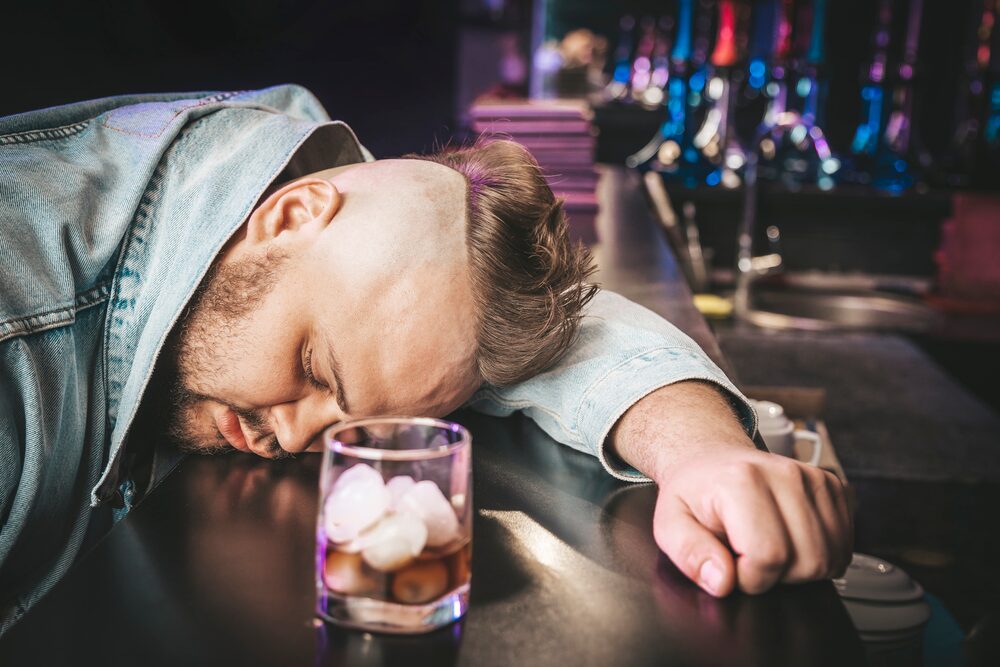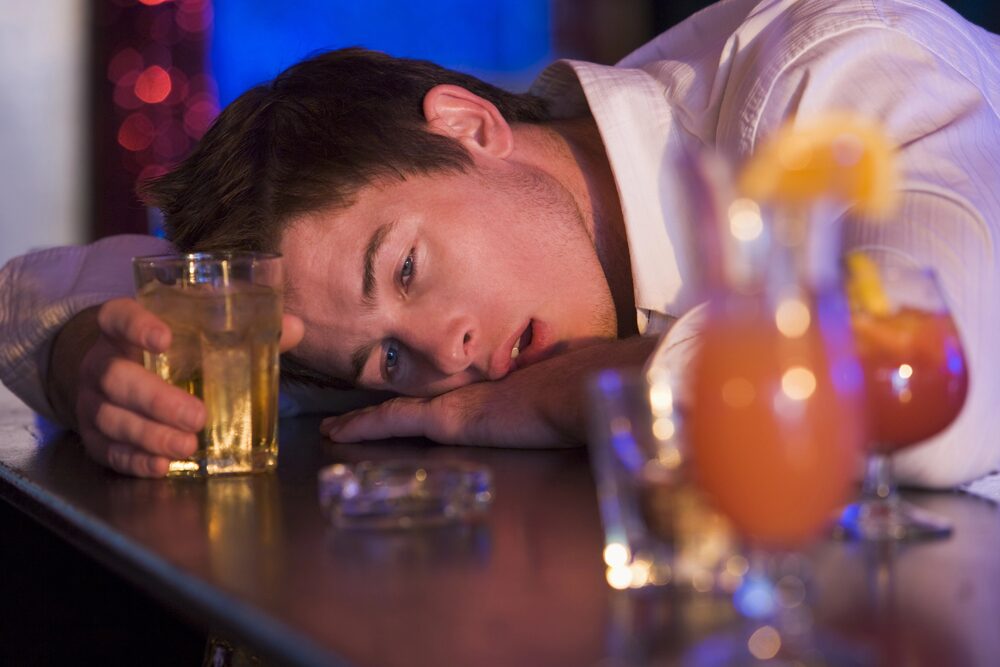Most people who regularly drink alcohol already know the symptoms of being intoxicated, like slurred speech and poor coordination. Sometimes though, you might be witnessing a severe health emergency and not even know it. Individuals who indulge in drinking so much alcohol in a short period are at significant risk of developing alcohol poisoning symptoms.
Your liver does a great job of blocking alcohol toxins from getting into the bloodstream. Drinking a lot of alcohol in a short period; however, your liver might not be able to keep up. This is the process that leads to alcohol poisoning, which is also known as an alcohol overdose.
The Truth About Alcohol Poisoning
Alcohol poisoning is severe, and in some cases, deadly. Drinking a lot of alcohol in a short period can result in increased heart rate, irregular breathing, extremely low body temperature, and gag reflex, which may lead to coma, permanent brain damage or death. Alcohol is a depressant that disrupts your brain and nervous system in ways that can slow down your breathing, heart rate, and other essential tasks that your body does. Alcohol overdose may also occur when children or adults accidentally drink products around the house that contain alcohol. An individual with alcohol poisoning must seek immediate medical attention. If you ever suspect that you or someone else has alcohol poisoning, call for emergency medical help right away.
Overcoming an addiction from substances or alcohol can be a very hard journey, and it’s important to have a trusted facility and staff by your side while you do it. Behavioral Health Centers is here to offer all our resources so you can live a happier and healthier life.
8 Signs and Symptoms of Alcohol Poisoning

Some signs of intoxication are physical and can be seen when knowing what to look for. Some signs of alcohol poisoning will include:
1st Sign of Alcohol Poisoning: Poor Coordination
When there is too much alcohol consumption, your coordination will alter. You’ll feel dizzy and start seeing double, which makes it tough to walk and focus visually on your surroundings. Your reflexes will also be slowed down, and all coordination becomes reduced due to the effects the alcohol has on your brain and the reflex timing.
2nd Sign of Alcohol Poisoning: Clammy Skin
The face, chest, back, arms, and hands will get clammy with through-the-roof alcohol levels. This is due to the pores squeezing out the excess alcohol the body cannot process fast enough through the liver, making sweating the next natural way to release the alcohol.
3rd Sign of Alcohol Poisoning: Smelling Like Alcohol
Alcohol ingested has a strong vapor that comes from the stomach that projects through the mouth and has a pure alcohol odor. Even if it is not obvious to smell, alcohol can be picked up with a breathalyzer that measures your blood alcohol concentration (BAC) and digitally reads what percentage of alcohol you have in your bloodstream.
4th Sign of Alcohol Poisoning: Slurred Speech
Alcohol relaxes inhibitions and reduces coordination. That will cause the effect of your speech being slurred due to the brain not being able to compute with the mouth the correct clarity or order of words in which to say. This creates mumbled and slurred words being projected.
5th Sign of Alcohol Poisoning: Red Eyes
The most physical indication an individual is intoxicated is by their eyes. A drunk person will have red, veiny, and watery, glazed eyes to them. The eyelids are usually lowered also, which makes the most obvious form of identifying intoxication without identifying the rest of the altered coordination.
6th Sign of Alcohol Poisoning: Confusion
When alcohol reaches the brain, it alters short-term memory and some vital functions. Individuals start to lose track of their surroundings, thoughts, and actions when intoxicated. Sometimes, the alcohol can make them blackout and completely not be able to recognize or remember a period they were conscious and engaging.
7th Sign of Alcohol Poisoning: Irregular heartbeat
The effects of heavy use of alcohol will slow down the heartbeat, almost to half the rate it normally goes. Alcohol is a depressant that slows down blood flow and waves to the brain which sends signals to the heart and lungs to function subconsciously.
8th Sign of Alcohol Poisoning: Passing Out and Unable to Wake
When somebody has too much to drink, the above signs will have negative effects on the brain’s efforts to stay conscious. Individuals that pass out may mumble or even take small steps but are completely unconscious, and any methods of waking them up might not work. This is a clear sign of alcohol poisoning that demands immediate medical help.

Signs and Symptoms of Alcohol Overdose
Symptoms that someone has alcohol poisoning can be more significant than others. Key signs of an alcohol overdose may include:
- Vomiting excessively
- Seizures
- Unable to stay awake
- Severely confused
- Long pauses between breaths
- Slow breathing or trouble breathing
- Slow heartbeat
- Low body temp
- Pale skin
Even without all of the above symptoms, it is highly suggested to seek medical help when somebody might have alcohol poisoning. An unconscious person who cannot be awakened is at high risk of dying. If you suspect that somebody has alcohol poisoning even without seeing these symptoms, you must seek immediate medical care. Knowing if someone is exhibiting alcohol poisoning symptoms vs drunk can be tough. Don’t wait till it’s too late to get help.
Alcohol Poisoning Causes
Consuming any type of alcohol can cause some other significant types of toxic poisoning that will require emergency treatment, including a stomach pump. Alcohol in the ethyl form can be found in mouthwash, some medications, cooking strikes, alcoholic beverages, and certain household products.
Ethyl alcohol poisoning will generally result from consuming too many alcoholic drinks, especially if consumed in a short period. Some other forms of alcohol like isopropyl alcohol, methanol, and ethylene can be found in lotions, some cleaning products, and rubbing alcohol.
The Definition of Binge Drinking
For a male, binge drinking is defined as when you’ve consumed five or more drinks in less than two hours. For a female, it is four drinks within less than two hours. Extreme binge drinking is double those amounts and is one of the greatest causes of alcohol poisoning.
Alcoholic beverages standard sizes are:
- 12 oz beer 5% alcohol
- 5 oz wine 12% alcohol
- 1.5oz liquor 40% alcohol
The Effects of Binge Drinking
One of the more significant causes of alcohol poisoning is binge drinking. Binge drinking is a pattern of heavy drinking when an individual quickly will consume five or more alcoholic drinks within a couple of hours or less. An alcohol binge period may last as long as a few hours up to a few days. It is possible to have alcohol poisoning before even passing out while engaging in binge drinking. Also, while unconscious or when you stop drinking, the alcohol will continue to be released from your stomach and intestines into your bloodstream, which will make the level of alcohol in your body continue to rise.
How Much Alcohol is Too Much?
Alcohol is absorbed through the body much quicker and long before most of the nutrients do. It also takes a lot more time for your body to flush the alcohol that you have consumed. Alcohol poisoning affects your liver. The more alcohol you drink, especially in a short period, the greater the risk you have of alcohol poisoning. A mixed drink may contain more than one serving of alcohol, and it might take longer to metabolize through the liver. The amount of time needed for your liver to break down every alcoholic beverage is one hour per drink.
Risk Factors for Alcohol Poisoning

Studies show that men and middle-aged individuals are at significant risk for alcohol poisoning. Experts say that men tend to drink more than women do. And middle-aged individuals are more likely to also take prescription drugs while drinking, which can also contribute to alcohol poisoning. While drinking alcohol, your size, weight, and the amount consumed will play a vital role in the risk of alcohol overdose. No two people will be at the same blood alcohol concentration (BAC) even if both are similar in physique and amount of alcohol consumed. Excessive alcohol brings blood alcohol concentration to a higher level and poses serious risks, including impaired judgment, reduced coordination, and a heightened chance of alcohol poisoning.
A few factors can increase your risk of alcohol poisoning, which include:
- Your health
- Your weight and size
- The percentage of alcohol in your drinks
- Whether you’re combining other drugs with alcohol
- Whether you’ve recently eaten
- Your alcohol tolerance level
- The rate and amount of alcohol you’ve consumed
Alcohol poisoning can happen to any and everybody of all ages. It is vital to know the risk factors that come with drinking and to know what to do if somebody does have alcohol poisoning.
Complications of Alcohol Poisoning
Individuals who drink alcohol at a higher rate than what is recommended are at risk for alcohol poisoning. Severe complications may also be coupled with binge drinking and excessive alcohol use. Some severe complications can result from alcohol poisoning, which will include:
- Choking: Alcohol causes vomiting from its effects that depresses your gag reflex, which increases the risk of choking on vomit, even if you are passed out.
- Breathing stops: Accidentally inhaling vomit into your lungs can lead to a severe or even fatal interruption of breathing.
- Severely dehydrated: Vomiting results in severe dehydration, which can lead to dangerously low blood pressure and an accelerated heart rate.
- Seizures: Blood sugar levels may drop low enough to cause seizures.
- Hypothermia: Poisoning can lead to low body temperature that can lead to cardiac arrest.
- Irregular heartbeat: Alcohol poisoning may cause the heart to beat irregularly or even to stop beating completely.
- Brain damage: Drinking heavily for long periods may cause irreversible brain damage.
- Alcohol poisoning deaths: Any of these issues above may lead to death from alcohol poisoning.
Overdose and alcohol poisoning can happen to anybody who over consumes too much alcohol in a short period. Most will have success with binge drinking and never worry about the risks and complications that come with alcohol poisoning because they feel susceptible. Know the risks, complications, and emergency actions to implement if needed.
Emergency Action for Alcohol Poisoning

It is crucial to know and understand that anybody at any age at any time may get alcohol poisoning. It is essential to know the correct steps to take in an emergency where somebody might be suffering from alcohol poisoning. If you suspect someone you’re with may have alcohol poisoning, take these crucial steps:
- Call 911 immediately.
- Keep them awake and sitting upright.
- Have them sip water if they are conscious.
- Cover them with a warm blanket.
- If they are passed out, put them on their side to prevent choking on vomit.
- Get ready to let the paramedics know about their symptoms and how much alcohol the person drank.
There are also some important things not to do because they may do more harm than good which include:
- Do not give them a cold shower; this may cause severe coldness.
- Do not give them food; this may cause choking or vomiting.
- Do not allow them to walk it off; this may lead to falling or other injuries.
If you are witnessing somebody suffering from alcohol poisoning, do not hesitate to get emergency services involved. This may not only assist them through the uncomfortable process that is alcohol poisoning but may also be life-saving to the individual suffering.
Preventing Someone From Experiencing Alcohol Poisoning
The absolute best way to avoid alcohol poisoning is to moderate, not binge drink. There are a few combinations, though like mood, and an empty stomach that may still put you at risk for alcohol poisoning.
Alcohol Poisoning Symptoms vs. Drunk – Here are a few suggestions that can help you avoid alcohol poisoning:

- Drink alcohol in moderation: While drinking alcohol, make sure you do so in moderation. For healthy adults, this means up to one drink a day for women of all ages and two drinks a day for men of all ages. While drinking, make sure you enjoy your beverage slowly.
- Don’t drink on an empty stomach: Having food in your stomach slows alcohol absorption somewhat, but it will not prevent alcohol poisoning if you are binge drinking.
- Communicate with your teenagers: Consult your teenagers about alcohol dangers, including binge drinking. Studies show that children who are warned about alcohol and their side effects become less likely to drink irresponsibly.
- Store products safely: If you have small children, storing alcohol-containing products like cosmetics, mouthwash, household cleaners, and medications into hard to reach places, or childproof kitchen cabinets will help prevent access to them. Toxic items in alcoholic beverages should be kept under lock and key and safely out of reach of children.
- Get follow-up care: If you or your teenager was treated for alcohol poisoning, be sure to ask about follow-up care. Meet with a health professional, particularly an experienced chemical dependency professional, which may help you to prevent future binge drinking, which may lead to alcohol poisoning.
Even when taking preventative measures, alcohol poisoning can still happen to anybody. Anybody who suffers from alcohol poisoning is highly suggested to look into some alcohol addiction treatment options.
Treating Alcohol Poisoning
Individuals who have alcohol poisoning and are admitted to a hospital will go through the alcohol poisoning treatment process. Individuals with swallowed life-threatening amounts of alcohol will have their stomachs pumped by medical treatment specialists. They will do this to keep any leftover alcohol from getting into the bloodstream and making the condition worse. While at the hospital getting treatment for alcohol poisoning, doctors will also:
- Give fluids through an IV
- Give the individual extra oxygen to help with breathing
- To pump and flush the stomach, removing all toxins from their bloodstream
Individuals suffering from an alcohol overdose will have relief, usually by the next day. You must not hesitate to call medical emergency services if you do see somebody suffering from alcohol poisoning.
Address Your Concerns Regarding Alcohol Addiction

Individuals who have a concern about substance abuse treatment because they are worried about a life without alcohol know that our team here at Behavioral Health Centers understands these concerns. We will work hard to ensure each individual has the answers and the assurance they need when they choose treatment options. Our team is dedicated to providing effective intensive care for each of our patients who have an alcohol use disorder.
At Behavioral Health Centers in Port St Lucie, FL, our mission is to ensure each of our patients gets the help they need to overcome their alcohol use disorder. If you have been struggling with alcohol abuse, know that there is hope for you, and you do not have to let alcohol addiction control the rest of your life. You deserve an alcohol addiction-free life. Please feel free to contact our team with any questions and allow us to help you achieve that goal of lifelong sobriety. Contact our professionals at Behavioral Health Centers today and allow us to help you through this challenging process.
Overcoming an addiction from substances or alcohol can be a very hard journey, and it’s important to have a trusted facility and staff by your side while you do it. Behavioral Health Centers is here to offer all our resources so you can live a happier and healthier life.







